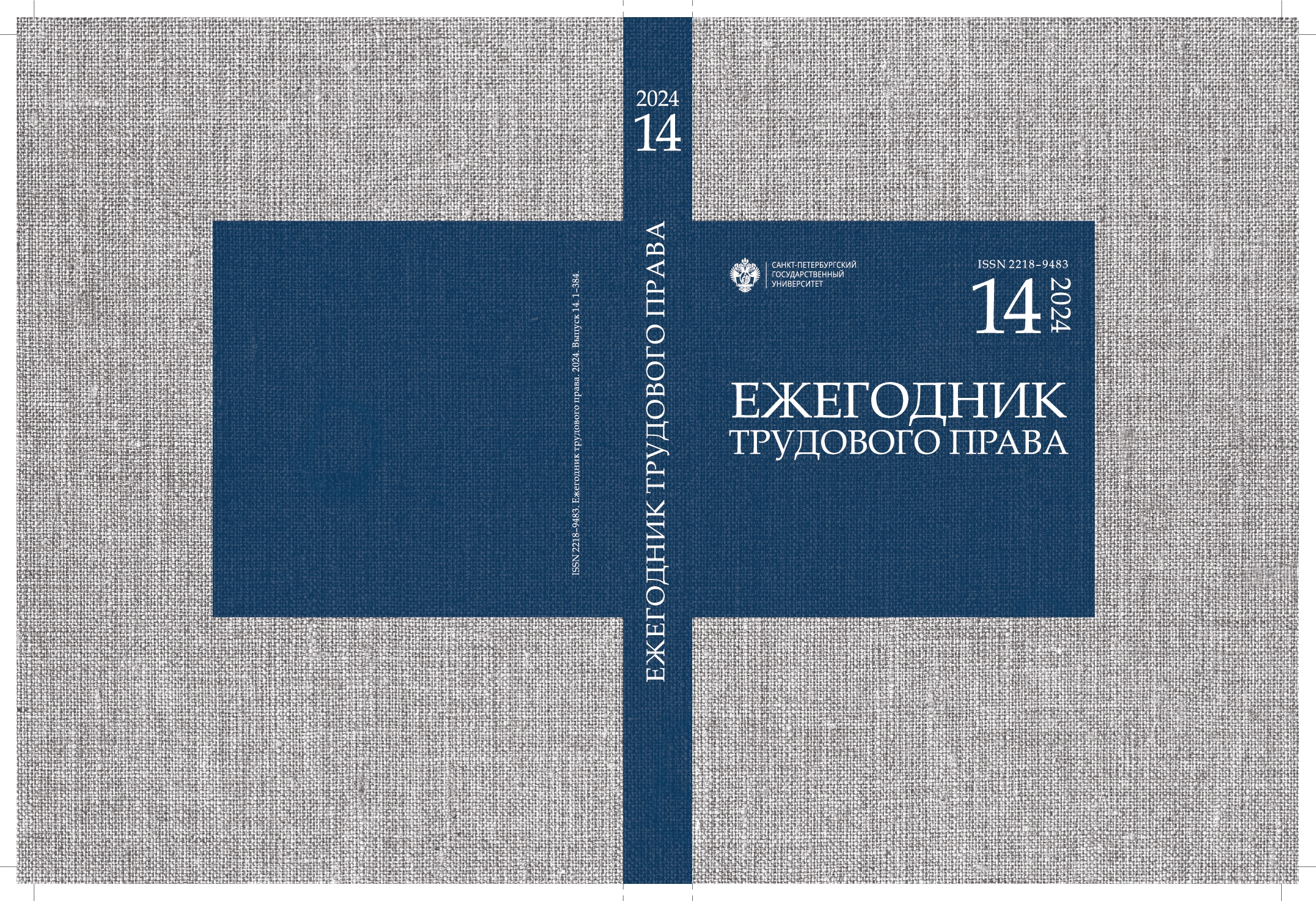The concept of disciplinary responsibility in the labor legislation of some post-Soviet countries: similarities in approaches, differences in difinitions
DOI:
https://doi.org/10.21638/spbu32.2024.122Abstract
The level of development of labor relations is seriously affected by many factors from the economic, which forms social stability and vectors of development of the country as a whole, to which sectors of the economy will be most in demand for labor, how and what related areas of scientific and industrial spheres will be involved. One of the institutions of labor law is undoubtedly the discipline of labor. How is the institute of labor discipline developing at the present stage in the post-Soviet space, what is common, what are the differences in the regulation of labor discipline under the labor legislation of a number of countries such as the Republic of Armenia, the Republic of Belarus, Kazakhstan, the Kyrgyz and Russian Federation, Azerbaijan, Moldova, Tajikistan, Turkmenistan, Uzbekistan, Ukraine, which were once part of the Soviet Union has become subject of research in this paper. Additional interest in the field of regulation of the institution of disciplinary relations is caused by its applications not for one, but for a number of states united in various coalitions (unions) by the example of building a uniform approach in establishing and regulating the norms of such an important institution of labor law, fixed in the form of secondary (model) noms.The purpose of this study is to identify similarities in approaches and search for differences in definitions, the mechanism of
regulation of the institution of disciplinary responsibility in labor legislation on the example of adopted labor codes in the legal systems of the member states of the Eurasian Economic Union and some other states.
Keywords:
disciplinary responsibility, disciplinary penalties, procedure for applying discipli- nary responsibility, general and special disciplinary responsibility, internal labor regulations
Downloads
References
Библиография
Дивеева, Нелли И. 1999. Договорные основы трудового права России. Барнаул: Изд-во Алтайского государственного университета.
Курс российского трудового права. 2007. В 3 т. Т. 1: Трудовой договор. Под ред. С. П. Маврина, Е. Б. Хохлова. СПб.: Юридический центр Пресс.
Лившиц, Роман З. 1972. «Правовые средства формирования производственных коллективов.» Трудовое право и повышение эффективности общественного производства. Москва: Наука: 20–98.
Лушников, Андрей М. и Марина В. Лушникова. 2004. Курс трудового права. В 2 т. Т. 2: Трудовые права в системе прав человека. Индивидуальное трудовое право. Москва: Проспект.
Томашевский, Кирилл Л. 2017. «Трудовые кодексы государств — членов Евразийского экономического союза и их место в системах трудового законодательства.» Вестник Санкт-Петербургского университета. Право 8 (2): 183–197.
References
Diveeva, Nelli I. 1999. Contractual bases of Russian Labor Law. Barnaul: Izd-vo Altajskogo gosudarstvennogo universiteta Press.
The course of Russian labor law. 2007. In 3 vols. Vol. 1: Labor contract. Ed. by S. P. Mavrin, E. B. Khokhlov. St. Petersburg: Iuridicheskii tsentr Press.
Livshic, Roman Z. 1972. “Legal means of forming production collectives.” Trudovoe pravo i povyshenie effektivnosti obshchestvennogo proizvodstva. Moscow: Nauka Publ.: 20–98.
Lushnikov, Andrej M., and Marina V. Lushnikova. 2004. The course of labor law. In 2 vols. Vol. 2: Labor rights in the human rights system. Individual labor law. Moscow: Prospekt Publ.
Tomashevskij, Kirill L. 2017. “Labor codes of the member States of the Eurasian Economic Union and their place in the systems of labor legislation.” Vestnik of St. Petersburg University. Law 8 (2): 183–197.
Downloads
Published
How to Cite
Issue
Section
License
Articles of "Russian Journal of Labour & Law" are open access distributed under the terms of the License Agreement with Saint Petersburg State University, which permits to the authors unrestricted distribution and self-archiving free of charge.




